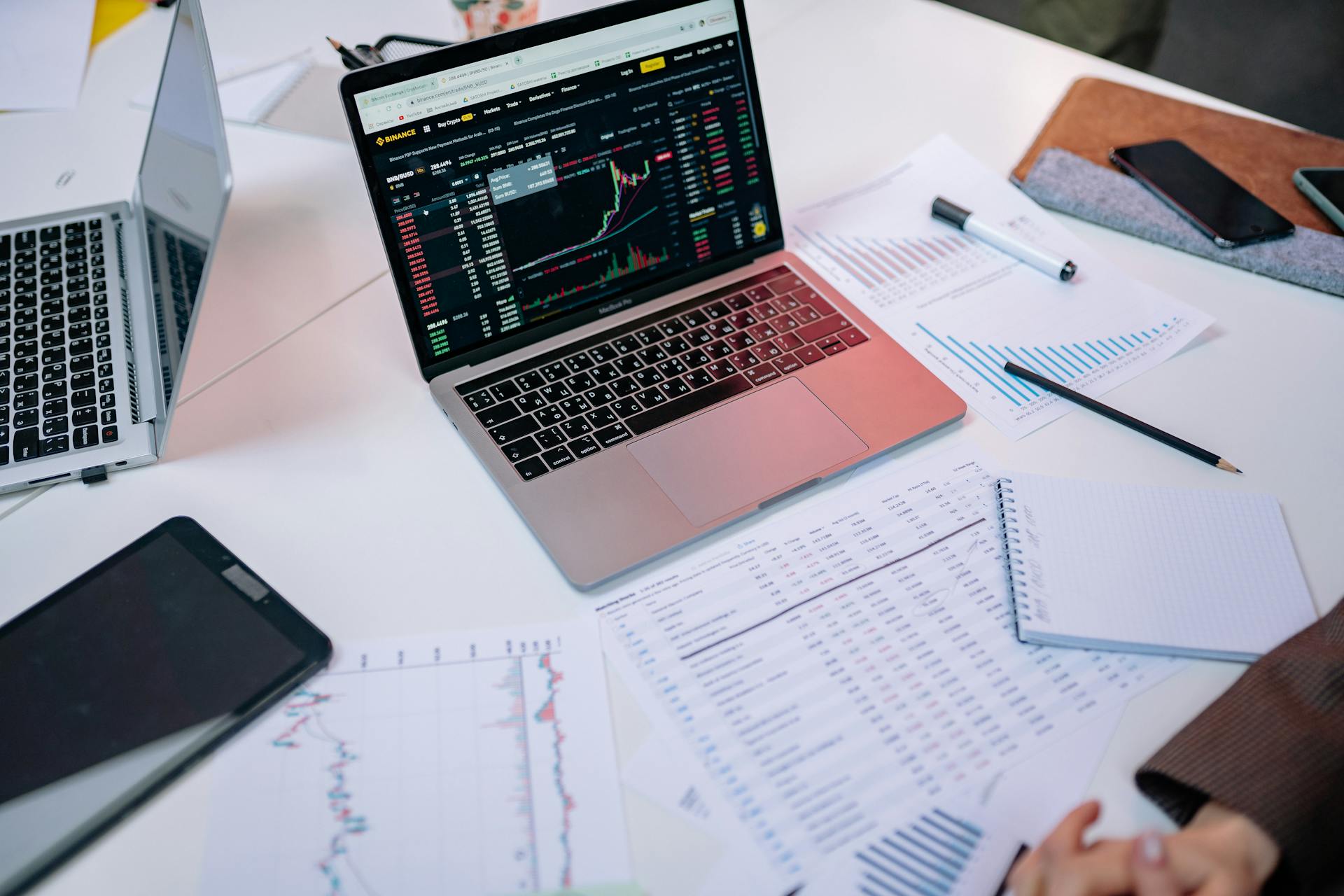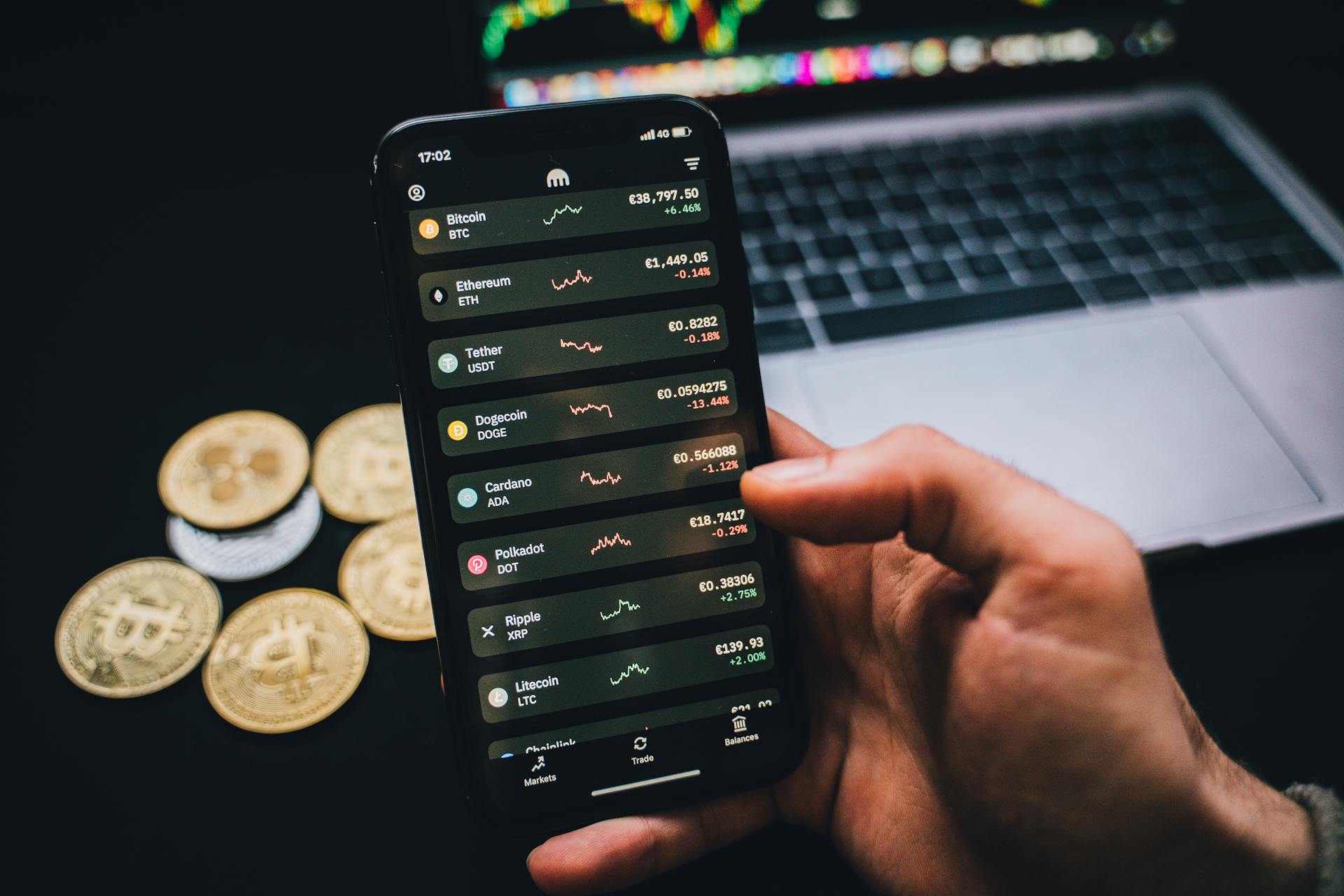
An equity trading desk is a critical component of a brokerage firm's operations, responsible for buying and selling stocks, bonds, and other securities on behalf of clients.
The primary goal of an equity trading desk is to generate revenue through trading activities.
There are two main types of equity trading desks: proprietary trading desks and agency trading desks.
Proprietary trading desks trade with their own money, while agency trading desks trade on behalf of clients.
Equity trading desks operate in a fast-paced environment, requiring traders to make quick decisions and execute trades rapidly.
The hours can be long and demanding, often extending beyond regular office hours.
To succeed in this field, one needs to have excellent analytical and communication skills, as well as the ability to think on their feet.
Career paths in equity trading desks can vary, but often start with entry-level positions such as trading assistants or junior traders.
Readers also liked: Ubs Trading Desk
Types of Trading Desks
There are various types of trading desks that operate within the financial industry, each specializing in specific markets and securities. Equity trading desks, for instance, handle everything from equity trading to exotic options trading.
Equity trading desks are often divided based on their client base, serving either institutional clients or executing trades for hedge fund clients. Fixed-income trading desks, on the other hand, handle government bonds, corporate bonds, and other bonds and bond-like instruments that pay a yield.
Trading desks can be further subdivided to specialize in narrower categories within main sectors. For example, fixed income is a broad category that can deal with anything from ultra-safe U.S. Treasuries to ultra-risky, low-grade company bonds.
Here are some of the main types of trading desks:
- Equity trading desks handle equity trading and exotic options trading.
- Fixed-income trading desks handle government bonds and corporate bonds.
- Foreign exchange trading desks facilitate trading in currency pairs.
- Commodity trading desks focus on agricultural products and other commodities.
- Derivatives trading desks specialize in derivatives, such as options and futures.
Electronic
Electronic trading desks are a vital part of the financial industry, providing clients with innovative solutions to navigate the rapidly changing market environment.
Trading desks utilize algorithmic and program trading to execute trades efficiently. They also offer commission management to help clients save on trading costs.
Electronic trading desks provide clients with access to Direct Market Access (DMA), which enables them to trade directly on the market. This allows for faster and more efficient execution of trades.
Market structure and index content are also important aspects of electronic trading desks. By analyzing these factors, traders can make informed decisions and stay ahead of the market.
Worth a look: Currency Carry Trade Definition
Cash and Derivatives
Cash and Derivatives trading desks are involved in a wide range of trading activities, including equity derivatives and exotic options.
These desks facilitate transactions related to stocks and equity-based instruments, aiming to generate returns based on price fluctuations and market trends.
To succeed in this role, you'll need to pitch clients on possible trade ideas that involve stocks, options, and variations of those.
You'll also help the bank place IPOs and follow-on issuances that the equity capital markets division is underwriting.
The key skill in this area is your ability to synthesize huge amounts of information into a concise, 1-2-minute pitch that convinces the client to trade with you.
Each time a trade is placed, you earn a commission, which is split between different groups in S&T.
Here's a breakdown of the types of trades you might be involved in:
- Stocks
- Equity derivatives
- Exotic options
- Custom basket swaps
- Equity-linked notes
- Global captivity
- Portfolio swaps
- Single-stock swaps
- U.S. index options
- U.S. stock options
Keep in mind that options trading is far more complex than stock trading because there are more variables and relationships to track.
Types of Desks
Trading desks can be categorized into different types based on the securities they handle. Each type operates within its specific market and employs traders with expertise in the corresponding securities.
Equity trading desks handle a wide range of securities, including equity trading and exotic options trading. They can be found at investment banks and other financial institutions.
Fixed-income trading desks are responsible for handling government bonds, corporate bonds, and other bond-like instruments that pay a yield. These desks can further subdivide into narrower categories, such as ultra-safe U.S. Treasuries and low-grade company bonds.
Foreign exchange trading desks facilitate trading in currency pairs by acting as market makers. They can also engage in proprietary trading activities.
Commodity trading desks focus on agricultural products, metals, and other commodities, such as crude oil, gold, and coffee.
Derivatives trading desks specialize in derivatives, such as options, futures, forwards, and swaps.
Here's a breakdown of the main types of trading desks:
Many brokers also offer trading desks for their clients, especially in the foreign exchange market and equity day trading market.
Job Description and Career Path
Equity trading deals with companies' stocks and their derivatives, which are financial instruments based on an underlying asset like a specific company's stock or an index of stocks.
As an equity trader, you'll execute buy/sell orders and make markets for clients, or you'll pitch ideas to clients to get them to trade in the first place. Salespeople focus on building relationships with clients and presenting research ideas, while traders focus on executing trades.
Equity traders can work in various roles, including agency trade, where they execute orders for institutional investors and earn a small fee, or making a market, where they help clients buy or sell securities at a agreed-upon price.
The career path in equity trading starts as an intern, where you'll shadow traders and salespeople and assist with tasks. As an Analyst, you'll take on more responsibility, including trading and client interactions, with increasing risk limits over time.
Broaden your view: Traders Day
Job Description
Equity trading deals with companies' stocks and their derivatives, which are financial instruments based on an underlying asset like a specific company's stock.
Derivatives include options, which give you the right to buy or sell a specified asset at a specified price within a time frame. An agency trade involves executing an institutional investor's order, like buying shares at the market price, for a small fee.
Making a market means helping a client buy or sell securities at a price both sides agree on. For example, a trader might offer to buy shares at $99 and sell at $101, with the hedge fund trader taking the latter price.
As a trader, you're "short" shares until you buy them back, and you'll need to divide large trades into smaller pieces to profit. The client also pays commissions, which can offset losses.
Salespeople spend the day speaking with clients and pitching ideas, while traders focus on executing buy/sell orders and making markets. Salespeople don't need to be experts in math or execution, but they must have a solid understanding of securities.
If you're outgoing and like the financial markets, sales might be a good fit, while trading suits those who prefer math and quick thinking.
You might like: Equity Shares Definition
Sales Career Path

As you start your sales career, you'll begin as an intern, where you'll be shadowing traders and salespeople, and assisting them with tasks that save them time.
You'll be creating tools, running errands, and doing work that keeps slipping off their to-do list, which is a great way to get a feel for the job and learn from experienced professionals.
As an Analyst, you'll start out doing similar work to assist senior traders and salespeople, and gradually, you'll be granted more trading and client responsibility if you perform well.
Your risk limits will increase over time, allowing you to make more aggressive trades with higher potential payoffs.
The day-to-day role won't change that much as you move from Analyst to Associate to VP to Director to Managing Director, unless you move to the managerial side and stop trading actively.
This path offers less career volatility, but it also means a lower chance of an outsized bonus if your team performs well.
Expand your knowledge: 30 Day Libor Rate
How to Become a Trader: Interview Questions
Interview questions for a trader position can be a challenge, but understanding what to expect can help you prepare. In the U.K., you'll face a video interview with 4-5 generic questions, each with a 30-second preparation time and a 2-3 minute recording time.
These questions tend to be about your personal story, teamwork and leadership experience, current market events, and the S&T product you're most interested in. You'll receive more in-depth questions if you make it to the Superday, which involves 5-10 one-on-one or two-on-one interviews.
You can increase your chances of success by being prepared to answer brainteasers, math questions, and product-specific questions, especially if you express interest in trading. Developing in-depth knowledge of a specific product, such as exotic equity derivatives, can also set you apart.
Having a good handle on math is essential, and programming knowledge is helpful, but you don't need to be a math wizard. Trading is more about applying your knowledge and making quick decisions under pressure than it is about complex math derivations.
Discover more: What Time Do Stocks Start Trading
Here are some key takeaways to keep in mind:
- Be prepared to answer generic questions in the video interview, such as your personal story and teamwork experience.
- If you express interest in trading, you'll face more brainteasers, math questions, and product-specific questions.
- Developing in-depth knowledge of a specific product can set you apart in interviews.
- Math and programming knowledge are helpful, but not necessary to be a successful trader.
Trader Salaries
As you consider a career in trading, it's essential to know what you can expect in terms of salary. Compensation for traders and salespeople is highly variable and linked to performance.
Traders at bulge-bracket banks in New York can earn significantly more than salespeople, with a 15-20% premium.
Here's a rough breakdown of trader salaries at these banks:
Keep in mind that as you move up the ladder, you'll receive a smaller portion of your bonus in cash, with the rest in stock and deferred compensation.
Right for You?
Equities sales & trading is geared toward "micro" analysis, focusing on individual companies. This type of analysis is perfect for those who have a keen eye for detail and enjoy following specific companies.
If you're more interested in the math/programming side, equities sales & trading could be a great fit for you. You'll have the opportunity to work on technology to automate the job and develop complex products such as exotics.
Broaden your view: Trading Equities for a Living

Working with clients on equity derivatives or individual companies can be a good fit if you've always followed companies closely. This role allows you to use your knowledge to pitch products to clients.
Equities sales & trading is a good choice if you enjoy complex math and programming. It's also a good fit if you want to work on technology to automate the job.
A unique perspective: Publicly Traded Private Equity Companies
Sources
- https://www.jefferies.com/our-services/equities/capabilities/
- https://www.investopedia.com/articles/investing/022416/different-trading-desks-investment-bank.asp
- https://mergersandinquisitions.com/equity-trading/
- https://www.kotaksecurities.com/investing-guide/share-market/what-is-a-trading-desk/
- https://www.investopedia.com/terms/t/tradingdesk.asp
Featured Images: pexels.com


